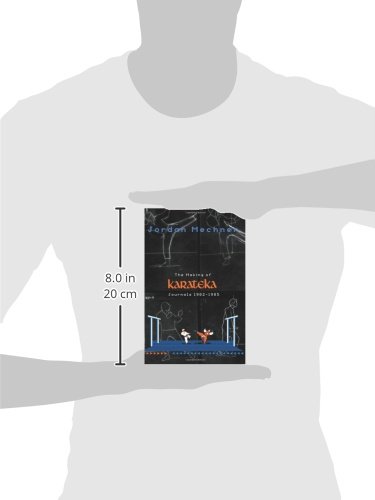



Full description not available
R**E
Good read if you grew.up in the Apple II/Commodore days
This is a great read for anyone who grew up with an Apple ][ or C64 and dreamed of writing the killer game in the 80s. Things were a lot different back then - and one person with enough skill, motivation and a computer really could do it all. I totally connected with Jordan's comments about life, school and the highs and lows of investing the time to bring a no-compromises vision of a game to life. An easy and fascinatong piece of history for anyone who dreamed of being famous by writing a game or who was a gamer growing up in that era. Totally worth it.
J**T
Amazing read for an 80's kid who loved games and coding
This was an amazing read for me. Not because of the writing, but because of the subject. I was a middle school kid at the time Karateka came out on my Commodore 64, and was instantly mesmerized by the game and its effect it had on people. The story was good, but it was the first game that actually had a cinematic feel for the play. You felt like you were part of a movie. Now this was a kid version of me, but I was in awe.I started writing games as a result of playing this one. I never achieved his level of success, but did have quite a few published while I was in high school. I even went on to work at a game company later after my military service.This is a collection of his personal journal during the time he built Karateka. It is raw and unedited. I went through all those same ups and downs as a kid (sort of still do as an adult!). It was refreshing to me to see something that I took to be an utter perfection was actually a labor of love for someone who struggled with it's creation.Refreshing read to see that others in the same field had a similar start and rough road. It is too easy to look back at your finished products and think it was obvious that is what was going to happen from the start. Every project I have ever worked on goes through a similar path of finding the right deliverable. You never start with a clean idea from the beginning and proceed to the end. This was a fun geeky read. Would have enjoyed hearing some of his coding travails as well, but this was very satisfying for a geek like me.
C**T
Flashback!
Why would someone read this? It's the epitomy of geekiness to read a 200 page journal about the making of one of thousands of simple games made for the Apple II between 1982-1986.Well, for me anyway, The Apple II was one of the most powerful elements of my childhood - I directly credit it with my interest in computers, and ultimately a successful career in computers. Games were a huge part of that. And, as I now understand, the zen-like minimalism and focus on artwork, music and story were a big part of why I loved this game as a kid. It is a great example of restraint and balance in art, even though it's on an underpowered Apple II computer. There were plenty of games at this time (hundreds, if not thousands) and very few showed the attention to detail, and sought a balance between art, gameplay, drama and mood the way Karateka did. The cinematic treatment of the story really does have a huge impact, and sets it apart from all the other games made at the time: the long pauses in some of the music, the slow motion running of the guards as they come to fight you, and actually, the lack of music for most of the game except during transitions are just some of the elements that help accomplish this.The story of its creation is interesting because Mechner was only 19 at the time he wrote it, he was a "lazy" but intelligent young man bent on success and impressing the world. (I would argue that his self criticism regarding motivation is now better understood as the way a creative mind works - it must be balanced with inspiration and sufficient spaces between 'make' time) He was also a bit of an ego-maniac, balanced with a kind of endearing insecurity, both of which I can relate to. Ultimately, I relate to a lot of Mechner's tendencies, which is why I read til the end. I'm also terribly interested in the creative process he used, and was very curious about how much of what we know and love as Karateka was intentional vs. what ended up being a compromise between his vision, the feedback of others, and technical (and temporal) feasibility. Almost all artistic (and business) creations have this element of compromise, and these stories are always fascinating to me.The story itself is interesting in how it's interwoven with his work on some other paid programming work, as well as the pop culture narrative of the mid-80's: Risky Business, Krull, Revenge of the Jedi, Dragon's Lair, Asteroids and Pac-man, Gremlins, Raiders, Splash, E.T., Top Secret, Neverending Story, The Last Starfighter (with Dune preview!), Karate Kid, Temple of Doom, and of course Chuck E. Cheese. Amazing how much of what I think of as quintessential 80's culture - culture which probably had more impact on me than anything else - happened precisely within this window while he was working on Karateka.In the end, what's most interesting to me is the reality behind a success - the often uncertain, insecure, yet driven and focused effort to make a name for yourself and show the world what you can do. To me, this story is ultimately about reassurance - that even the most successful endeavors are rarely the product of 100% focused and confident actions, but instead the result of good creative judgment, intuition, and intense focus, in spite of a great degree of uncertainty about whether you're doing something worthwhile.My only complaint is that there are lots of references to drawings and some to film, which are not shown, and which I think would have added immeasurably to the story here. There are a few drawings which act as chapter title pages, but otherwise, this is seemingly a straight transcription from his journals, and nothing more. A bit of context/commentary from Mechner or others could have made this much more interesting as well. All that said, however, I enjoyed it, and take it as inspiration and reassurance that you can accomplish great things if you have a strong vision, and move towards it with limited compromise.
I**F
Very fun and educational read!
If your are a Karateka fan or a POP fan..... Or just a fan of Mechner in general. You will enjoy these journals. An excellent personal account and insight on what it takes to make a game. From programming to getting it published and the trials that go along with that, including some personal trials of game industry versus movie industry. It's all there. Once you are done with this, I recommend picking up his other "Making of Prince of Persia" journal. As it continues where this leaves off. My only complaint is that they end rather abruptly so I hope he continues to put out his journals for when he was making "The Last Express". But either way, a very fun and educational read.
J**S
Unanswered questions...
It's a journal and edited at that, so I'm not sure just how much of it was changed from what really happened. My problem is that if the journal was edited, then why not add some commentary to fill in the gaps? I finished the book and was left asking, just how many copies did Karateka sell and did it make Jordan tons of money, did piracy kill revenue or did Broderbund make the money? I know this may be off topic for the dates of the journal, but I really wanted to know how Jordan got started in assembler, who taught him, how did he afford to buy one himself? I was only 13 during this time period and these were my obstacles, I wanted to know how he overcame them.
A**P
A nice insight into the first wave of computer gaming/computers
A nice insight into the first wave of computer gaming/computers. The cultural references are mind-boggling. However, some additional features would have been nice: a timeline; a little more background on Mechner himself; and maybe some commentary sections. Nevertheless, it's a fascinating read.
S**N
Inspirational to say the least
Great book, such a fun read and very inspirational.
G**S
Fantastic!
It looks I have found a treasure reading one of the classics that most influenced my childhood. Easy reading and straight to the subject. I recommend it for all game designers so that they may understand the ups and downs of a creativeness crisis and also for all retrogamers.
L**S
Addictif
Ce livre comme les autres livres de l'auteur est inspirant. Vous ne pouvez pas vous décrochez avant de l'avoir terminé.
E**A
A journey into game development
I didn't know what to expect from this book, I loved the game as a kid and I was just curious. I really enjoyed going through Jordan's diary, his style is dry, but I empathised with him the whole time. He never took himself too seriously and narrates very well the complexity of game development. I wish I was as smart as him at his age. Thanks for recording this experience, and sharing it with us!
I**V
An hones diary of a young game designer
The book feels very intimate and honest. I was impressed by the thoughts of the young Jordan Mechner in his very early attempt to lead in a very young industry. I wish I had read this book when I was staring my own game design career.
Trustpilot
2 months ago
1 day ago